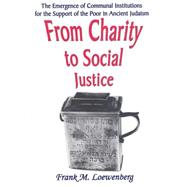Summary
Every society has had to cope with poverty and the poor. Traditionally, most scholars have located the origins of modern philanthropies in the free-grain-distribution schemes common in ancient Greece and Rome, while most social workers see the history of philanthropic or welfare institutions as beginning with the Elizabethan Poor Laws. A few students know that the early Christian church made provisions for the poor, but few are aware of what occurred prior to the beginning of Christianity. This volume provides evidence that contemporary philanthropic and welfare institutions owe a greater debt to Judaism than to the Greco-Roman culture.By skillful use of source documents, the author explores Jewish influence on early Christian charities, seeing it as more important than previously believed.He traces the evolution of charitable institutions in ancient Judaism from the days of the monarchy until the conclusion of the Talmud, a period of about fifteen hundred years. He demonstrates how responsibility for support of the poor was initially placed on the individual, with every farmer obligated to provide for the poor from his field. Dramatic increases in the number and proportion of poor people made major structural changes imperative. A theme throughout the book is how communal institutions evolved in place of individual responsibility. The change was gradual and not without opposition. How these changes came about and in what functional areas they occurred are discussed, as well as an analysis of Jewish support for the non-Jewish poor and non-Jewish support for the Jewish poor. In an appendix, the author discusses the philanthropies of the early Christians.From Charity to SocialJustice adds to current debates on the role of religious institutions in welfare programs. It will be of particular interest to those who are interested in the history of philanthropy and in the development of welfare institution
Author Biography
Frank M. Loewenberg is professor emeritus at the school of social work of Bar Ilan University in Israel.
Table of Contents
| Preface |
|
9 | (2) |
| Introduction |
|
11 | (8) |
|
|
|
19 | (32) |
|
Evolution of Inequality and Poverty in Judea |
|
|
51 | (28) |
|
Enigma of Change and Other Conundrums |
|
|
79 | (12) |
|
Emergence of Philanthropic Institutions for the Support of the Poor |
|
|
91 | (36) |
|
Agricultural harvest portions for the poor |
|
|
92 | (4) |
|
|
|
96 | (5) |
|
|
|
101 | (6) |
|
Jubilee and land ownership |
|
|
107 | (3) |
|
|
|
110 | (5) |
|
From individual charity to communal philanthropic institutions |
|
|
115 | (12) |
|
Emergence of Indirect Institutional Supports for the Poor |
|
|
127 | (28) |
|
|
|
127 | (5) |
|
Contractual slavery and indentured servants |
|
|
132 | (7) |
|
Provisions for poor travelers |
|
|
139 | (5) |
|
Elementary education for the poor |
|
|
144 | (2) |
|
Health services for the poor |
|
|
146 | (2) |
|
Special provisions for poor windows and orphans |
|
|
148 | (2) |
|
Differential sacrifices of the poor |
|
|
150 | (5) |
|
From Charity to Social Justice |
|
|
155 | (26) |
| Appendix: Philanthropies of the Early Christians |
|
181 | (14) |
| Bibliography |
|
195 | (8) |
| Bibliographical Index |
|
203 | (16) |
| General Index |
|
219 | |

